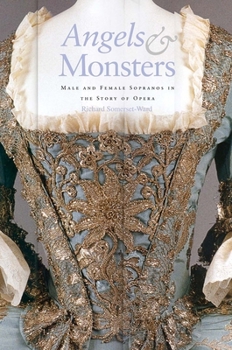Angels and Monsters: Male and Female Sopranos in the Story of Opera, 1600-1900
Select Format
Select Condition 
Book Overview
A riveting history of the early male and female sopranos for whom many of the greatest roles in opera were written During its first two centuries, opera was dominated by sopranos. There were male sopranos, or castrati, whose supercharged voices (female vocal cords powered by male lungs) were capable of feats of vocalism that are hard to imagine today. And there were female sopranos, or prima donnas, whose long battle for social acceptance and top...
Format:Hardcover
Language:English
ISBN:0300099681
ISBN13:9780300099683
Release Date:April 2004
Publisher:Yale University Press
Length:325 Pages
Weight:1.40 lbs.
Dimensions:1.1" x 6.4" x 9.5"
Customer Reviews
2 ratings
Entertaining but not good scholarship by any means
Published by Thriftbooks.com User , 17 years ago
This book has some very interesting anecdotes about singers, which a casual reader would enjoy. However, the author's core argument is not meaningful or compelling, and his research (as others have noted) is severely lacking. His argument, that singers had to behave themselves after Verdi because of decreased focus on beautiful singing in the opera world, has no relationship to other work being done in this area of musicology. Additionally, a skilled writer could have made the argument in a twenty page article.
Scholarship and Scandal
Published by Thriftbooks.com User , 20 years ago
Richard Somerset-Ward, a distinguished figure in the arts and the media on both sides of the Atlantic, has followed his History of Opera with a work no less scholarly but now laced with largely unfamiliar anecdote and scandal (NB two entries in the index under Nudity). The angels and monsters of the title are essentially inseparable facets of the same person - angelic of voice, monstrous of temperament. They could indulge their whims and tantrums because, as Somerset-Ward points out, it was they who sold tickets at the box office, not the composers. Sometimes the public were the victims of capricious decisions not to appear when expected or not to sing what had been advertised (or, indeed, what the composer had written). But generally it was the poor impresario who suffered most.The lay reader may be surprised to find the male soprano given equal prominence in the book's title with his female counterpart but, as the book makes clear, the castrato was a significant influence on this improbable art form for well over two centuries. "Basically female equipment powered by massively developed male lungs," says Somerset-Ward, made for a formidable sound.Among the many colourful characters who emerge from these pages, the author has a clear admiration for Mathilde Marchesi whose operatic career as a singer was limited to a single public performance. Her contribution has been as a teacher in her own right, and in the way her pupils, become teachers themselves, have passed on her principles to the present day's singers.Somerset-Ward argues persuasively that the singers who thrived on angelic sounds alone were on the wane by the beginning of the twentieth Century - Nellie Melba, he suggests, was one of the last. Outrageous behaviour will doubtless linger longer. This is a book that can be enjoyed by all who have been caught up by the Dramma per Musica, but perhaps it should be kept away from rising young sopranos in search of role models.






